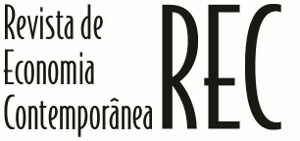ABSTRACT
This paper discusses the relationship between external financial liberalization - both in terms of capital account liberalization and financial integration - and the macroeconomic performance of Brazil’s economy by estimating vector error correction model (VEC). As a potentially original contribution, it has been found a causal relation, in Grange sense, between the global financial movements and the degree of financial integration and between the latter and the country risk. Also, evidence has been found that an increased degree of capital account liberalization did not produce relevant macroeconomic effects. Additionally, results show that a high degree of financial integration had problematic repercussions in variables such as exchange rate volatility and activity level.
KEYWORDS:
financial liberalization; macroeconomic performance; Brazil

 Fonte: Elaboração própria.
Fonte: Elaboração própria.
 Fonte: Elaboração própria.
Fonte: Elaboração própria.
 Fonte: Elaboração própria.
Fonte: Elaboração própria.